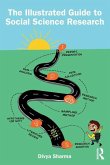Laura Caulfield (UK Bath Spa University), Jane Hill (UK Birmingham City University)
Criminological Skills and Research for Beginners
A Student's Guide
Laura Caulfield (UK Bath Spa University), Jane Hill (UK Birmingham City University)
Criminological Skills and Research for Beginners
A Student's Guide
- Broschiertes Buch
- Merkliste
- Auf die Merkliste
- Bewerten Bewerten
- Teilen
- Produkt teilen
- Produkterinnerung
- Produkterinnerung
This book is a comprehensive and engaging guide to research methods in Criminology, and the skills required for academic success. It is designed as a lively and accessible guide to planning, conducting, and reporting research in the field.
Andere Kunden interessierten sich auch für
![Criminological Skills and Research for Beginners Criminological Skills and Research for Beginners]() Laura Caulfield (UK Bath Spa University)Criminological Skills and Research for Beginners58,99 €
Laura Caulfield (UK Bath Spa University)Criminological Skills and Research for Beginners58,99 €![A Queer Praxis for Criminological Research A Queer Praxis for Criminological Research]() April Carrillo (USA University of South Dakota)A Queer Praxis for Criminological Research71,99 €
April Carrillo (USA University of South Dakota)A Queer Praxis for Criminological Research71,99 €![Revitalizing Criminological Theory Revitalizing Criminological Theory]() Steve Hall (UK Teesside University)Revitalizing Criminological Theory58,99 €
Steve Hall (UK Teesside University)Revitalizing Criminological Theory58,99 €![Analysing Student Feedback in Higher Education Analysing Student Feedback in Higher Education]() Analysing Student Feedback in Higher Education51,99 €
Analysing Student Feedback in Higher Education51,99 €![The Illustrated Guide to Social Science Research The Illustrated Guide to Social Science Research]() Divya SharmaThe Illustrated Guide to Social Science Research56,99 €
Divya SharmaThe Illustrated Guide to Social Science Research56,99 €![Qualitative Research in Sport Management Qualitative Research in Sport Management]() James SkinnerQualitative Research in Sport Management53,99 €
James SkinnerQualitative Research in Sport Management53,99 €![Methodological Advances in Research on Social Movements, Conflict, and Change Methodological Advances in Research on Social Movements, Conflict, and Change]() Thomas V. MaherMethodological Advances in Research on Social Movements, Conflict, and Change145,99 €
Thomas V. MaherMethodological Advances in Research on Social Movements, Conflict, and Change145,99 €-
-
-
This book is a comprehensive and engaging guide to research methods in Criminology, and the skills required for academic success. It is designed as a lively and accessible guide to planning, conducting, and reporting research in the field.
Produktdetails
- Produktdetails
- Verlag: Taylor & Francis Ltd
- 2 ed
- Seitenzahl: 316
- Erscheinungstermin: 23. April 2018
- Englisch
- Abmessung: 234mm x 156mm x 17mm
- Gewicht: 586g
- ISBN-13: 9781138041431
- ISBN-10: 1138041432
- Artikelnr.: 51572697
- Herstellerkennzeichnung
- Libri GmbH
- Europaallee 1
- 36244 Bad Hersfeld
- gpsr@libri.de
- Verlag: Taylor & Francis Ltd
- 2 ed
- Seitenzahl: 316
- Erscheinungstermin: 23. April 2018
- Englisch
- Abmessung: 234mm x 156mm x 17mm
- Gewicht: 586g
- ISBN-13: 9781138041431
- ISBN-10: 1138041432
- Artikelnr.: 51572697
- Herstellerkennzeichnung
- Libri GmbH
- Europaallee 1
- 36244 Bad Hersfeld
- gpsr@libri.de
Laura Caulfield is Professor and Chair of the Institute for Community Research and Development at the University of Wolverhampton, UK. Jane Hill was the Programme Director for the Criminology BA at Birmingham City University, UK, before her retirement in 2012.
Part I: Study Skills for Criminology Students 1. Writing Skills and Essay
Writing 2. Referencing 3. Revision Skills and Examination Techniques 4.
Presentation Skills Part II: The Importance of Criminological Research 5.
The context of criminological research: power, knowledge, politics, and
values 6. The significance of criminological research: understanding the
philosophical roots of our claims to know about crime in society 7. The
ethics of criminological research Part III: Getting Going with
Criminological Research 8. Planning: Where do research ideas come from? How
do we 'fine tune' them? 9. Critiquing the literature and the process of
writing your formal review 10. Theories, methods, and their relationships
to theories of knowledge 11. Preparing for the practical challenges of
real-world crime research Part IV: Doing Criminological Research: Data
Collection 12. Ethnographic approaches to research 13. Questionnaires and
surveys 14. Using documentary and secondary data sources Part V: Doing
Criminological Research: Analysis and writing-up 15. Analysing the data:
Quantitative analysis 16. Analysing the data: Qualitative analysis 17.
Analysing the data: Documents, texts, and other data 18. Writing-up
criminological research.
Writing 2. Referencing 3. Revision Skills and Examination Techniques 4.
Presentation Skills Part II: The Importance of Criminological Research 5.
The context of criminological research: power, knowledge, politics, and
values 6. The significance of criminological research: understanding the
philosophical roots of our claims to know about crime in society 7. The
ethics of criminological research Part III: Getting Going with
Criminological Research 8. Planning: Where do research ideas come from? How
do we 'fine tune' them? 9. Critiquing the literature and the process of
writing your formal review 10. Theories, methods, and their relationships
to theories of knowledge 11. Preparing for the practical challenges of
real-world crime research Part IV: Doing Criminological Research: Data
Collection 12. Ethnographic approaches to research 13. Questionnaires and
surveys 14. Using documentary and secondary data sources Part V: Doing
Criminological Research: Analysis and writing-up 15. Analysing the data:
Quantitative analysis 16. Analysing the data: Qualitative analysis 17.
Analysing the data: Documents, texts, and other data 18. Writing-up
criminological research.
Part I: Study Skills for Criminology Students 1. Writing Skills and Essay
Writing 2. Referencing 3. Revision Skills and Examination Techniques 4.
Presentation Skills Part II: The Importance of Criminological Research 5.
The context of criminological research: power, knowledge, politics, and
values 6. The significance of criminological research: understanding the
philosophical roots of our claims to know about crime in society 7. The
ethics of criminological research Part III: Getting Going with
Criminological Research 8. Planning: Where do research ideas come from? How
do we 'fine tune' them? 9. Critiquing the literature and the process of
writing your formal review 10. Theories, methods, and their relationships
to theories of knowledge 11. Preparing for the practical challenges of
real-world crime research Part IV: Doing Criminological Research: Data
Collection 12. Ethnographic approaches to research 13. Questionnaires and
surveys 14. Using documentary and secondary data sources Part V: Doing
Criminological Research: Analysis and writing-up 15. Analysing the data:
Quantitative analysis 16. Analysing the data: Qualitative analysis 17.
Analysing the data: Documents, texts, and other data 18. Writing-up
criminological research.
Writing 2. Referencing 3. Revision Skills and Examination Techniques 4.
Presentation Skills Part II: The Importance of Criminological Research 5.
The context of criminological research: power, knowledge, politics, and
values 6. The significance of criminological research: understanding the
philosophical roots of our claims to know about crime in society 7. The
ethics of criminological research Part III: Getting Going with
Criminological Research 8. Planning: Where do research ideas come from? How
do we 'fine tune' them? 9. Critiquing the literature and the process of
writing your formal review 10. Theories, methods, and their relationships
to theories of knowledge 11. Preparing for the practical challenges of
real-world crime research Part IV: Doing Criminological Research: Data
Collection 12. Ethnographic approaches to research 13. Questionnaires and
surveys 14. Using documentary and secondary data sources Part V: Doing
Criminological Research: Analysis and writing-up 15. Analysing the data:
Quantitative analysis 16. Analysing the data: Qualitative analysis 17.
Analysing the data: Documents, texts, and other data 18. Writing-up
criminological research.








